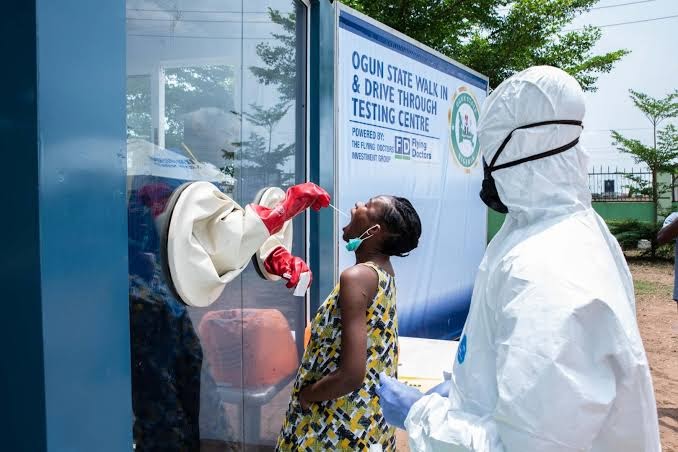Africa Records Fastest Surge In COVID-19 Cases This Year – WHO
At the current pace of vaccination, WHO estimates that it will take until May 2022 before Africa reaches 40 per cent coverage and August 2024 before it reaches the 70 per cent mark.

The World Health Organization (WHO) pandemic assessment has revealed an 83 per cent surge in new COVID-19 cases during the past week in Africa.
According to the assessment, the new cases, which are driven by the Delta and the Omicron variants, are causing fewer deaths than previous surges, but more waves could be building as updated forecasts warn that the continent may not reach 70 per cent vaccine coverage until August 2024.
Dr Matshidiso Moeti, WHO Regional Director for Africa said this during a virtual press conference facilitated by APO Group on Tuesday, Dec. 14.
The assessment revealed that Africa recorded more than 196,000 new cases for the week on Sunday, Dec. 12, up from around 107,000 in the previous week, bringing the total cumulative number of recorded cases during the pandemic to 8.9 million.
“The number of COVID-19 cases is doubling every five days, the shortest reported this year. While the speed of the spread is fast, deaths remain low and even dropped by 19 per cent last week compared with the previous week,” the assessment reads.
The WHO Regional Director for Africa said the slow vaccine rollout in Africa means that deaths and severe illness will be much higher than they should be if vaccination against Covid is not met.
“We’ve known for quite some time now that new variants like Beta, Delta or Omicron could regularly emerge to spark new outbreaks globally, but vaccine-deprived regions like Africa will be especially vulnerable,” she added.
The WHO Director said as of Monday, Dec. 13, only 20 African countries had vaccinated at least 10 per cent of their population, a target set by WHO, and only six countries have hit the year-end target of fully vaccinating 40 per cent of their population, while only two countries—Mauritius and Seychelles—have reached the 70 per cent coverage seen as essential for controlling the pandemic.
At the current pace of vaccination, WHO estimates that it will take until May 2022 before Africa reaches 40 per cent coverage and August 2024 before it reaches the 70 per cent mark.
WHO data show that 53 African countries have initiated vaccination programmes, which have administered a total of 264 million doses (or 61 per cent of doses received). Fully vaccinating 70 per cent of Africans requires about 1.6 billion more doses and strengthened efforts to increase vaccine demand.
Coupled with the slow vaccination rollout, little over 3000 deaths were reported during the first three weeks of the current pandemic wave, which is Africa’s fourth, the assessment revealed.
“This upsurge in new cases coupled with low hospitalizations is particularly marked in South Africa which has experienced a 66 per cent rise in new cases during the past seven days compared with the previous seven days,”
While hospitalizations have increased by 67 per cent in the past seven days, the assessment reads, the bed occupancy rate for Intensive Care Units remains low at 7.5 per cent, with 14 per cent of the hospitalized patients receiving supplemental oxygen. Though the deaths also remain low, this data should be interpreted with caution as the pattern may change in the coming weeks.
“We’re at a pivotal moment in this pandemic where complacency is the enemy. With supplies starting to increase we now must intensify our focus on other barriers to vaccination. They include lack of funding, equipment, healthcare workers and cold chain capacity along with tackling vaccine hesitancy.”
According to the WHO Africa COVID-19 readiness dashboard, of the 34 countries that have submitted complete data, 28 countries (80 per cent) have engaged provinces and districts in preparations for vaccinations; 32 countries (91 per cent) have conducted national training initiatives, and 29 countries (82 per cent) have trained district vaccinators and volunteers.
To increase vaccination coverage, the health organisation is encouraging countries to move vaccination sites beyond health facilities and main cities and implement community-centred approaches. In an analysis of data collected from 40 countries, six countries confirmed having districts with no vaccination sites.
Meanwhile, Moeti said Africa’s vaccine challenges are being compounded by Omicron-related travel bans.
Globally, there have been more than 2700 Omicron cases reported in 59 countries, including 11 African countries that account for about 33 per cent of the total cases. However, Africa’s share is steadily dropping, and South Africa no longer leads the world in Omicron cases. More than 70 countries continue to impose travel bans mainly targeting African countries,” she said.
“Blanket travel bans have little impact on the course of an epidemic but have a massive socioeconomic effect, coming after two years of COVID-19, these new travel restrictions are jeopardizing the health of millions of Africans.”
In addition to vaccination coverage, WHO’s 2022 COVID-19 strategy for Africa includes a strong focus on surveillance aimed at increasing case detection, strengthening genomic surveillance to track new variants of concern as well as country capacity for appropriate case management including home-based isolation and care, and guarding against COVID-19 with key preventive measures amidst reduced risk perception.
Support Our Journalism
There are millions of ordinary people affected by conflict in Africa whose stories are missing in the mainstream media. HumAngle is determined to tell those challenging and under-reported stories, hoping that the people impacted by these conflicts will find the safety and security they deserve.
To ensure that we continue to provide public service coverage, we have a small favour to ask you. We want you to be part of our journalistic endeavour by contributing a token to us.
Your donation will further promote a robust, free, and independent media.
Donate HereStay Closer To The Stories That Matter




